go_french
外研版 六年级下册《 单元 2 What are you going to study》同步练习卷
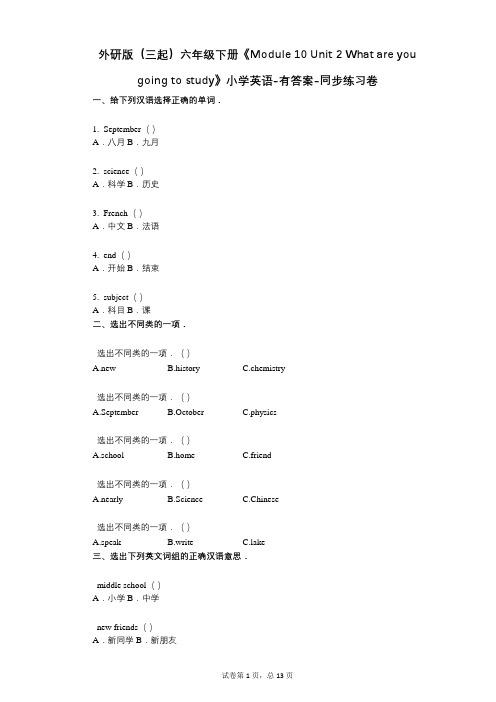
外研版(三起)六年级下册《Module 10 Unit 2 What are you going to study》小学英语-有答案-同步练习卷一、给下列汉语选择正确的单词.1. September()A.八月 B.九月2. science()A.科学 B.历史3. French()A.中文 B.法语4. end()A.开始 B.结束5. subject()A.科目 B.课二、选出不同类的一项.选出不同类的一项.()A.newB.historyC.chemistry选出不同类的一项.()A.SeptemberB.OctoberC.physics选出不同类的一项.()A.schoolB.homeC.friend选出不同类的一项.()A.nearlyB.ScienceC.Chinese选出不同类的一项.()A.speakB.writeke三、选出下列英文词组的正确汉语意思.middle school()A.小学 B.中学new friends()A.新同学 B.新朋友study French()A.学法语 B.学英语in September()A.在九月 B.在十月go to school()A.去上学 B.去学校四、按要求写单词.September(缩写)________.friend(复数)________happy(副词)________.near________finish(过去式)________.subject(复数)________learn(过去式)________五、单项选择.Are you going to middle school ___ September?()A.in B.on C.atI'm going to _____ French.()A.studyB.studyingC.studiesIt's time to ____ goodbye now.()A.sayingB.sayC.saysWhich middle school do you ___?()A.likesB.likeC.likingI can speak ____ you.()A.ofB.forC.toWe'll always ____ friends.()A.isB.areC.be六、选出下列英文句子的正确汉语翻译.选出下列英文句子的正确汉语翻译.I'm not going to study French.()A.我不打算学法语 B.我不学法语选出下列英文句子的正确汉语翻译.We are going to study History.()A.我们打算学历史 B.我们要上历史课What about you ?()A.你呢? B.你是做什么的?选出下列英文句子的正确汉语翻译.Which school is Amy going to ?()A.哪个学校是艾米的学校?B.艾米打算去哪个学校?When are you going to go home?()A.你打算什么时候回家? B.你家住哪里?选出下列英文句子的正确汉语翻译.He's going to study English.()A.他打算学英语 B.他正在学英语七、连词成句.going , to , I , am , study , Maths(.)________about what you ?________anew , time , it , is ,to , start(.)________to ,can , I , you , speak (?)________write , we , can , English , in (.)________do , you , like , which , middle , school (?)________参考答案与试题解析外研版(三起)六年级下册《Module 10 Unit 2 What are you going to study》小学英语-有答案-同步练习卷一、给下列汉语选择正确的单词.1.【答案】该题考查单词翻译.八月August;九月September.故选:B.【考点】单词、词组【解析】八月August.【解答】该题考查单词翻译.八月August;九月September.故选:B.2.【答案】该题考查单词翻译.科学science,历史history.故选:A.【考点】单词、词组【解析】科学science.【解答】该题考查单词翻译.科学science,历史history.故选:A.3.【答案】该题考查单词翻译.中文Chinese,法语French.故选:B.【考点】单词、词组【解析】法语French.【解答】该题考查单词翻译.中文Chinese,法语French.故选:B.4.【答案】该题考查单词翻译.开始begin,结束end.故选:B.【考点】【解析】结束end.【解答】该题考查单词翻译.开始begin,结束end.故选:B.5.【答案】该题考查单词翻译.subject科目,lesson课.故选:A.【考点】单词、词组【解析】subject科目【解答】该题考查单词翻译.subject科目,lesson课.故选:A.二、选出不同类的一项.【答案】A【考点】词性分类【解析】new新的.history历史.chemistry化学.【解答】本题考查词性分类.A.new新的,形容词.B.history历史,名词.C.chemistry化学,名词.选项A与其他选项词性不同,故选:A.【答案】C【考点】类别分类【解析】September九月;October十月;physics物理.【解答】本题考查类别分类.September九月,月份名词;October十月,月份名词;physics物理,学科名词;A、B属于月份名词,C属于学科名词,选项C与其他几个不同类.故选:C.【答案】C【考点】类别分类【解析】school学校;home家;friend朋友.本题考查类别分类.school学校,地点名词;home家,地点名词;friend朋友,人物名词;A、B都是地点名词,C是人物名词,选项C与其他几个不同类.故选:C.【答案】A【考点】词性分类【解析】nearly差不多.Science科学.Chinese中国人.【解答】本题考查词性分类.A.nearly差不多,副词.B.Science科学,名词.C.Chinese中国人,名词.选项A与其他选项词性不同,故选:A.【答案】C【考点】词性分类【解析】speak说.write写.lake湖.【解答】本题考查词性分类.A.speak说,动词.B.write写,动词.C.lake湖,名词.选项C与其他选项词性不同,故选:C.三、选出下列英文词组的正确汉语意思.【答案】该题考查短语翻译.middle school中学,小学primary school.故选:B.【考点】翻译能力【解析】middle school中学【解答】该题考查短语翻译.middle school中学,小学primary school.故选:B.【答案】本题考查短语翻译.new students新同学.new friends新朋友.故选:B.【考点】翻译能力【解析】新朋友.【解答】本题考查短语翻译.new students新同学.new friends新朋友.故选:B.【答案】该题考查短语翻译.study French学法语,study English学英语.故选:A.【考点】翻译能力【解析】study French学法语【解答】该题考查短语翻译.study French学法语,study English学英语.故选:A.【答案】该题考查短语翻译.in September在九月,in October在十月.故选:A.【考点】翻译能力【解析】in September在九月【解答】该题考查短语翻译.in September在九月,in October在十月.故选:A.【答案】该题考查短语翻译.go to school去上学;去学校go to the school.故选:A.【考点】翻译能力【解析】go to school去上学【解答】该题考查短语翻译.go to school去上学;去学校go to the school.故选:A.四、按要求写单词.【答案】Sept.【考点】全写和缩写Getting to know you: My birthday【解析】Sept.九月.【解答】本题考查全写与缩写.September,名词,九月,缩写是Sept.故填Sept.【答案】【考点】可数名词及其单复数【解析】朋友【解答】本题考查可数名词及其单复数.friend朋友,其复数形式为:friends.故答案为:friends.【答案】happily【考点】词性转换Places and activities: ShoppingThe natural world: Wind【解析】happy快乐的.【解答】考查词性转化.happy快乐的,其副词形式是happily,快乐地.故填:happily.【答案】附近【考点】单词、词组【解析】附近【解答】考查单词翻译.根据near,译为:附近.故答案为:附近.【答案】finished【考点】一般过去时,动词过去式【解析】finish完成,结束.【解答】答案:finished.考查动词的过去式.finish是规则动词,按照变化规则:一般情况加ed,直接加"ed",变成finished.【答案】subjects【考点】可数名词及其单复数Our town科目【解答】本题考查名词复数.subject的复数形式为subjects.故答案为:subjects.【答案】learned/learnt【考点】一般过去时,动词过去式【解析】学习【解答】本题考查动词的过去式,根据动词过去式的变化规则,可知learn的过去式是learned/learnt.故答案为:learned/learnt.五、单项选择.【答案】A【考点】介词【解析】你九月份要上中学吗?【解答】考查介词.at,用在表示具体几点几分钟的短语前.on,用在表示具体哪一天的单词前.in,用在表示年月的时间前.根据"September"可知这里是月份,在月份面前用介词in.故选:A.【答案】A【考点】动词原形【解析】我打算去学法语.【解答】考查动词原形.题干表达我打算去学法语.打算做某事be going to do sth.题干中to后面用动词原形study.故选:A.【答案】B【考点】动词原形【解析】现在到了说再见的时候了.【解答】考查动词原形.题干表达现在到了说再见的时候了.到了做某事的时候It's time to do sth.固定用法.题干中to后面应用动词原形say.故选:B.【答案】B【考点】动词原形【解析】你喜欢哪所中学?【解答】考查动词原形根据Which middle school do you ___?这里do是一个助动词,后面的实义动词应该用原形like.故选:B.【答案】B【考点】介词【解析】我可以为你说话.【解答】考查介词的辨析.of属于…的,for为了,to去、到.speak for sb译为:为…说话,发言,符合题意.故选:B.【答案】C【考点】动词原形【解析】我们永远是朋友.【解答】考查动词原形根据We'll always ____ friends.这里we'll=we will,will是情态动词,后面要跟动词原形be.故选:C.六、选出下列英文句子的正确汉语翻译.【答案】本题主要考查英译汉.I'm译为:我是.not译为:不.going to译为:打算要,将要.study译为:学习.French译为:法语.结合整句与中文的表达习惯,应译为:我不打算学法语.故选:A.【考点】英译汉【解析】我不打算学法语.【解答】本题主要考查英译汉.I'm译为:我是.not译为:不.going to译为:打算要,将要.study译为:学习.French译为:法语.结合整句与中文的表达习惯,应译为:我不打算学法语.故选:A.【答案】本题主要考查英译汉.we译为:我们.are译为:是.going to译为:将要.study译为:学习.History译为历史.结合整句与中文的表达习惯,应译为:我们打算学历史.故选:A.【考点】英译汉【解析】我们打算学历史.【解答】本题主要考查英译汉.we译为:我们.are译为:是.going to译为:将要.study译为:学习.History译为历史.结合整句与中文的表达习惯,应译为:我们打算学历史.故选:A.【答案】考查英译汉.分析英语句子,What about you?本句是固定句型,译为:你呢?故选:A.【考点】英译汉【解析】你呢?【解答】考查英译汉.分析英语句子,What about you?本句是固定句型,译为:你呢?故选:A.【答案】本题主要考查英译汉.which译为:哪一个.school译为:学校.is译为:是.Amy译为:艾米.going to译为:将要,打算要.结合整句与中文的表达习惯,应译为:艾米打算去哪个学校?故选:B.【考点】英译汉【解析】艾米打算去哪个学校?【解答】本题主要考查英译汉.which译为:哪一个.school译为:学校.is译为:是.Amy译为:艾米.going to译为:将要,打算要.结合整句与中文的表达习惯,应译为:艾米打算去哪个学校?故选:B.【答案】考查英译汉.分析英语句子,When什么时候,are you going to你打算,go home回家.本句是一般将来时的特殊疑问句,结合整句及汉语表达习惯,据此本句翻译为:你打算什么时候回家?故选:A.【解析】你打算什么时候回家?【解答】考查英译汉.分析英语句子,When什么时候,are you going to你打算,go home回家.本句是一般将来时的特殊疑问句,结合整句及汉语表达习惯,据此本句翻译为:你打算什么时候回家?故选:A.【答案】本题考查英译汉.he's他是.going to将要,打算要.study学习.English英语.结合整句与中文的表达习惯,应译为:他打算学英语.故选:A.【考点】英译汉【解析】他打算学英语.【解答】本题考查英译汉.he's他是.going to将要,打算要.study学习.English英语.结合整句与中文的表达习惯,应译为:他打算学英语.故选:A.七、连词成句.【答案】I am going to study Maths.【考点】连词成句【解析】我将要学数学.【解答】考查连词成句.句意"我将要学数学."这是一个陈述句.主语I"我".一般将来时态.结构是be going to或will后跟动词原形.这里用am going to.动词原形用study"学习".宾语Maths"数学".故答案为:I am going to study Maths.【答案】What about you ?【考点】连词成句【解析】你呢?【解答】考查连词成句,问号表示问句句式,"What about "表示"…怎么样?",复合疑问词;"有 "表示"你",主语;结合要求完成.故答案为:What about you ?【答案】It's time to start a new.【解析】到重新开始的时候了.【解答】考查连词成句.句意"到重新开始的时候了(是时候重新开始了)."这是一个陈述句.It's time to do sth到做某事的时间了.固定搭配.不定式to后跟动词原形start"开始".最后是副词a new"再、重新".故答案为:It's time to start a new.【答案】CanIspeaktoyou?【考点】连词成句【解析】我能和你说话吗?【解答】考查连词成句.句意"我能和你说话吗?"根据"问号"可知,原句是一般疑问句.含有情态动词,变一般疑问句情态动词Can开头.主格I做主语.谓语动词用原形speak.speak to sb"和某人说话".sb用"you"代替.故答案为:Can I speak to you?【答案】WecanwriteinEnglish【考点】连词成句【解析】我们可以用英语写作.【解答】考查连词成句.句意"我们可以用英语写作."这是一个陈述句.主语We"我们".情态动词can后跟谓语动词原形write"写".in English"用英语"做状语.故答案为:We can write in English.【答案】Which middle school do you like?【考点】连词成句【解析】你喜欢哪所中学?【解答】考查连词成句.句意"你喜欢哪所中学?"根据"问号"可知,原句是特殊疑问句.疑问词Which修饰名词短语middle school "中学".后跟一般疑问句,助动词do开头.主语you.谓语动词用原形like"喜欢".故答案为:Which middle school do you like?。
沪教版初中英语七年级Unit2基础知识练习及
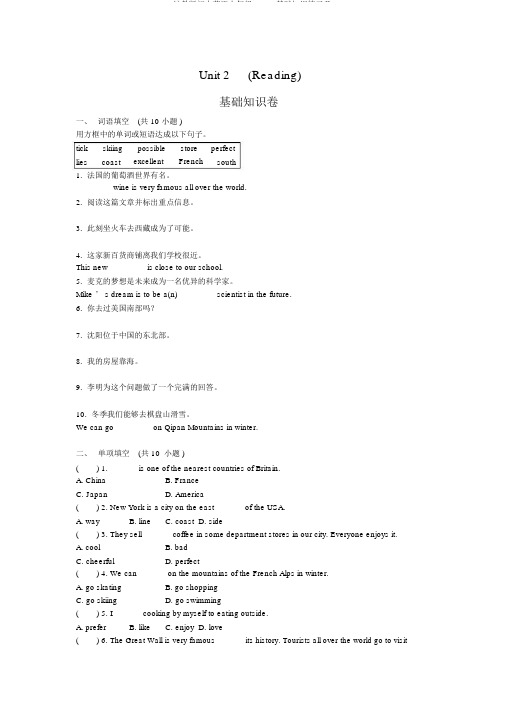
Unit 2(Reading)基础知识卷一、词语填空(共 10 小题 )用方框中的单词或短语达成以下句子。
tick lies skiingcoastpossibleexcellentstoreFrenchperfectsouth1.法国的葡萄酒世界有名。
________ wine is very famous all over the world.2.阅读这篇文章并标出重点信息。
3.此刻坐火车去西藏成为了可能。
4.这家新百货商铺离我们学校很近。
This new ________ is close to our school.5.麦克的梦想是未来成为一名优异的科学家。
Mike ’ s dream is to be a(n) ________ scientist in the future.6.你去过美国南部吗?7.沈阳位于中国的东北部。
8.我的房屋靠海。
9.李明为这个问题做了一个完满的回答。
10.冬季我们能够去棋盘山滑雪。
We can go ________ on Qipan Mountains in winter.二、单项填空(共 10小题 )() 1. ______ is one of the nearest countries of Britain.A. ChinaB. FranceC. JapanD. America() 2. New York is a city on the east ______ of the USA.A. wayB. lineC. coastD. side() 3. They sell ______ coffee in some department stores in our city. Everyone enjoys it. A. cool B. badC. cheerfulD. perfect() 4. We can ______ on the mountains of the French Alps in winter.A. go skatingB. go shoppingC. go skiingD. go swimming() 5. I ______ cooking by myself to eating outside.A. preferB. likeC. enjoyD. love() 6. The Great Wall is very famous ______ its history. Tourists all over the world go to visitit every year.A. inB. forC. asD. to() 7. We can’ t drink any ______ when we are driving a car.A. juice B milk C. wine D. water() 8.—We are waiting for him for a long time, but he is still not here.—Let ’s ______ calling him this time.A. tryB. rememberC. remainD. leave() 9. Lucy often ______ on the beach and reads books.A. knocksB. watchesC. plays D . lies() 10. ______ Paris is ______ capital of ______ France.A. The; the; theB. /; the; /C. /; a; theD. The; a; /三、句子改写(共 5 小题)1.You can go to the Louvre Museum if you like art. ( 就划线部分发问 )________ ________ I go if I like art?2.You can try skiing on the mountains in the French Alps. ( 就划线部分发问 )________ can I try ________ in the French Alps?3.China has something for everyone, so why not visit China this year? ( 同义句改写 )China has something for everyone, so ________ ________ visiting China this year?4. If you prefer to go shopping, there are many big department stores in Beijing. (同义句改写 )If you ________ ________ shopping, there are many big department stores in Beijing.5. They will find many famous places of interest in Paris. ( 改为一般疑问句 )________ they ________ many famous places of interest in Paris?四、完形填空(共 5 小题)Do you know France? France is in1Europe. It is a country2many beautiful places. Paris is the3of France. Here you will find many famous places of4such as the Eiffel Tower. You can go to the Louvre Museum5you like art.() 1. A. west B. WestC. WesternD. western() 2. A. with B. of C. in D. has() 3. A. town B. countryC. capitalD. village() 4. A. interesting B. interestedC. interestsD. interest() 5. A. and B. if C. but D. so五、短文填空(共 15 小题)A )阅读短文 , 而后从方框中选出适合的单词填入文中空白处。
包含French的习语
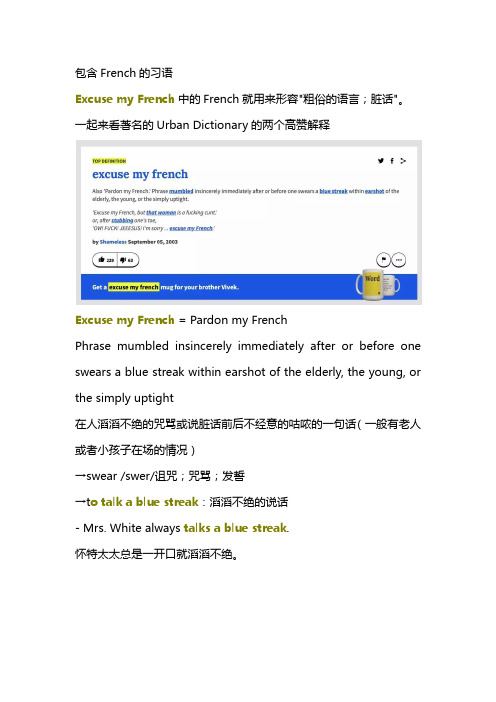
包含French的习语Excuse my French中的French就用来形容"粗俗的语言;脏话"。
一起来看著名的Urban Dictionary的两个高赞解释Excuse my French = Pardon my FrenchPhrase mumbled insincerely immediately after or before one swears a blue streak within earshot of the elderly, the young, or the simply uptight在人滔滔不绝的咒骂或说脏话前后不经意的咕哝的一句话(一般有老人或者小孩子在场的情况)→swear /swer/诅咒;咒骂;发誓→t o talk a blue streak:滔滔不绝的说话- Mrs. White always talks a blue streak.怀特太太总是一开口就滔滔不绝。
Pardon my bad language, or forgive me for swearing.French在这里等于bad language和swearing.Excuse my French. 抱歉我说脏话了- What a jerk! Excuse my French.-这简直就是一个傻冒!不好意思我说脏话了!后来,这句话被英国人带去了美洲大陆,导致现在成了美国人的口头禅。
脑补一下:如果一个美国人当着一个法国人的面说脏话后又说了一句Excuse my French,场面会有多尴尬。
无独有偶,既然英国人这么看不上法国人,肯定不单单只有这么一个短语啦:to take French leave不告而别;不辞而别英国人觉得法国人特别傲慢,极度自我,以至于参加一些party要离开的时候都不会跟主人打一个招呼。
- Did she take French leave at the party last Sunday?-她在上周日的派对中不告而别了吗?- Why did you take French leave yesterday?-昨天你怎么不打声招呼就走了啊?French window落地窗英国人认为法国人奢侈、纸醉金迷。
甘肃省武威第一中学初中英语八年级下册Unit 1经典习题(专题培优)
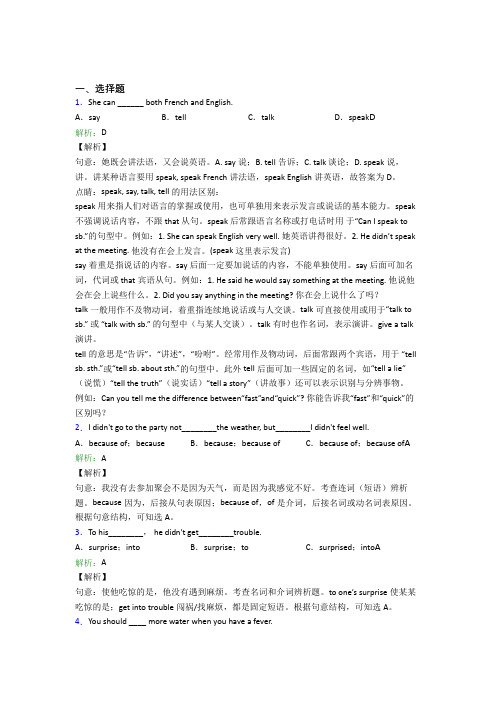
一、选择题1.She can ______ both French and English.A.say B.tell C.talk D.speak D解析:D【解析】句意:她既会讲法语,又会说英语。
A. say说;B. tell告诉;C. talk 谈论;D. speak说,讲。
讲某种语言要用speak, speak French讲法语,speak English讲英语,故答案为D。
点睛:speak, say, talk, tell的用法区别:speak 用来指人们对语言的掌握或使用,也可单独用来表示发言或说话的基本能力。
speak 不强调说话内容,不跟that 从句。
speak 后常跟语言名称或打电话时用于“Can I speak to sb.”的句型中。
例如:1. She can speak English very well. 她英语讲得很好。
2. He didn’t speak at the meeting. 他没有在会上发言。
(speak 这里表示发言)say着重是指说话的内容。
say 后面一定要加说话的内容,不能单独使用。
say后面可加名词,代词或 that宾语从句。
例如:1. He said he would say something at the meeting. 他说他会在会上说些什么。
2. Did you say anything in the meeting? 你在会上说什么了吗?talk一般用作不及物动词,着重指连续地说话或与人交谈。
talk可直接使用或用于“talk to sb.” 或“talk with sb.” 的句型中(与某人交谈)。
talk有时也作名词,表示演讲。
give a talk 演讲。
tell的意思是“告诉”,“讲述”,“吩咐”。
经常用作及物动词,后面常跟两个宾语,用于“tell sb. sth.”或“tell sb. about sth.”的句型中。
英语中的法语词汇
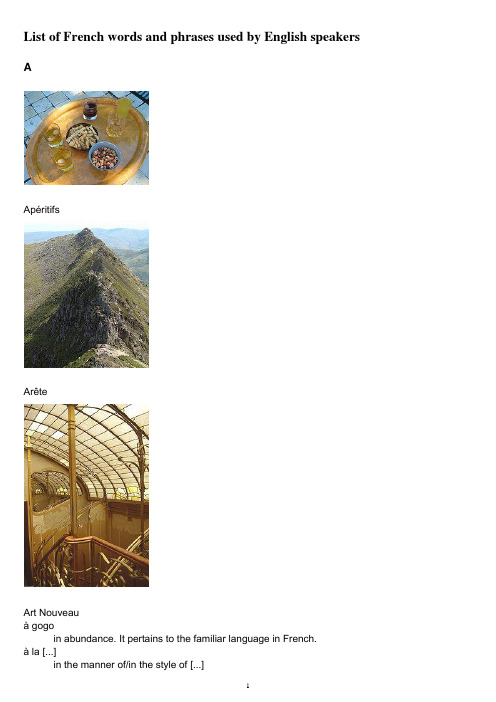
List of French words and phrases used by English speakers AApéritifsArêteArt Nouveauà gogoin abundance. It pertains to the familiar language in French.à la [...]in the manner of/in the style of [...]à la carteliterally: on the menu; In restaurants it refers to ordering individual dishes rather than afixed-price meal.à proposregarding/concerning (note that the correct French syntax is à propos de)abattoirslaughterhouseaccouchementconfinement during childbirth; the process of having a baby; only this last meaning remains in Frenchacquis communautaireused in European Union law to refer to the total body of EU law accumulated thus far.adieufarewell; literally means "to God," it carries more weight than "au revoir" ("goodbye", literally "Until next time"): it is definitive, implying you will never see the other person again. Depending on the context, misuse of this term can be considered as an insult, as you'll wish for the other person's death or will say that you don't wish to see the other person ever again while alive. It is used for "au revoir" in south of France[1] and to point a deprivation from someone or something. adroitskillful, clever, in French: habile, as a "right-handed" person would be using his "right" hand, as opposed to his left one with which he would be "gauche" meaning "left".aide-mémoire"memory aid"; an object or memorandum to assist in remembrance, or a diplomatic paperproposing the major points of discussionallez!"go!" or "come on!", as a command or as encouragmentamuse-bouche or amuse-gueulea single, bite-sized hors d'œuvre.ancien régimea sociopolitical or other system that no longer exists, an allusion to pre-revolutionary France(used with capital letter in French with this meaning : Ancien Régime)aperçupreview; a first impression; initial insight.apéritifa before-meal drink (in familiar French, it is shortened as "apéro"). In French, it means eitherthe drink or food (amuse-gueules....) you take before a meal. Also, in France, even if you'resupposed to eat after an apéritif, it is socially accepted to take your meal at home, therefore you can have an apéritif at a bar (with or without friends), or at a friend's before going back home. appellation contrôléesupervised use of a name. For the conventional use of the term, see Appellation d'originecontrôléeaprès moi, le délugeliterally: After me, the deluge; remark attributed to Louis XV of France; used in reference to the impending end of a functioning French monarchy and predicting the French Revolution. No.617 Squadron Royal Air Force, famously known as the "Dambusters", uses this as its motto.Also a verse in the song Après Moi by Regina Spektor.arêtea narrow ridge. In French, also fishbone; edge of a polyhedron or graph; bridge of the nose. armoirea type of cabinet; wardrobe.art nouveaua style of decoration and architecture of the late 19th and early 20th centuries. It bears a capitalin French (Art nouveau).attachéa person attached to an embassy; in French is also the past participle of the verb attacher (= tofasten, to tight, to be linked...)Attaque au FerAn attack on the opponent's blade in fencing, e.g. beat, expulsion, pressure.au contraireon the contrary.au courantup-to-date; abreast of current affairs.au faitbeing conversant in or with, or instructed in or with.au jusliterally, with juice, referring to a food course served with sauce. Often redundantly formulated, as in 'Open-faced steak sandwich, served with au jus.'. No longer used in French, except for the slang "être au jus" (to be informed)au paira young foreigner who does domestic chores in exchange for room and board. In France, thosechores are mainly child care/education.au revoir!"See you later!" In French a contraction of Au plaisir de vous revoir (to the pleasure of seeing you again).avant-garde (pl. avant-gardes)applied to cutting-edge or radically innovative movements in art, music and literature;figuratively "on the edge", literally, a military term, meaning "vanguard" (which is thedeformation of avant-garde) or "advance guard", in other words, "first to attack" (antonym of arrière-garde).avant la lettreused to describe something or someone seen as a precursor or forerunner of something (such as an artistic or political movement) before that something was recognized and named, e.g. "a post-modernist avant la lettre", "a feminist avant la lettre"; the expression literally means before the letter, i.e. "before it had a name".avec plaisirmy pleasure (lit. "with pleasure")Balletbric-à-bracBriocheBureauballeta classical type of dancebeau gesteliterally "beautiful gesture"; gracious gesture; also, a gesture noble in form but meaningless in substance. in French : a selfless/generous/fair-play act.Beaux-Artsmonumental architectural style of the early 20th century made famous by the Académie des Beaux-Artsbeaucoupplenty, lots of, much; merci beaucoup: thanks a lot; misused in slang, for example "beaucoup money" (French would add the preposition de : "beaucoup d'argent"), especially in NewOrleans, LA. Occasionally corrupted to Bookoo, typically in the context of French influenced by Vietnamese culture.bel esprit (pl. beaux esprits)literally "fine mind"; a cultivated, highly intelligent personbellea beautiful woman or girl. Common uses of this word are in the phrases the belle of the ball (themost beautiful woman or girl present at a function) and southern belle (a beautiful woman from the southern states of the US)Belle Époquea period in European social history that began during the late 19th century and lasted untilWorld War I.belles-lettresliterally "fine letters"; literature regarded for its aesthetic value rather than its didactic orinformative content; also, light, stylish writings, usually on literary or intellectual subjectsbien fait !literally "well done"; used to express schadenfreude when someone is well-deservedlypunishedbien pensantliterally "well thinking"; right thinking, orthodox. Commonly implies willful blindness to dangers or suffering faced by others. The noun form bien-pensance is rarely seen in English.blaséunimpressed with something because of over-familiarity, jaded.Bleu celesteliterally "sky blue", is a rarely-occurring tincture in heraldry (not being one of the seven main colours or metals or the three "staynard colours").bon appétitliterally "good appetite"; enjoy your mealbon motwell-chosen word(s), particularly a witty remarkbon vivantone who enjoys the good life, an epicureanbon voyageliterally "good journey"; have a good trip!bonjour"good day", a standard greeting in the morning or afternoonbonne chance"good luck" (as in, 'I wish you good luck')les boules(vulgar) literally "the balls"; meaning that whatever you are talking about is dreadful bourgeoismember of the bourgeoisie. The word used to refer to shopkeepers living in towns in the Middle Ages. Now the term is derogatory, and it applies to a person whose beliefs, attitudes, andpractices are conventionally middle-class.bric-à-bracsmall ornamental objects, less valuable than antiques; a collection of old furniture, china, plate and curiosities. Cf. de bric et de broc, corresponding to our "by hook or by crook", and brack, refuse.briochea sweet yeast bun, kind of a crossover between a popover and a light muffin; French also usethe term as slang for 'potbelly', because of the overhang effect.brunettea brown-haired girl. For brown-haired man, French uses brun and for a woman brune."Brunette" is rarely used in French, unless in old literature, and its masculine form, "brunet" (fora boy), is almost unheard of.bureau (pl. bureaux)office. Also means "desk" in French.CCafé au lait Chaise longueChauffeurChignonCul-de-sacContre-jourCreperieça ne fait rien"that doesn't matter"; rendered as san fairy Ann in British WWI slang [2].cachetlit. "stamp"; a distinctive quality ; quality, prestige.caféa coffee shop (also used in French for "coffee").café au laitcoffee with milk; or a light-brown color. In medicine, it is also used to describe a birthmark that is of a light-brown color (café au lait spot).calquea copied term/thingcarte blancheunlimited authority; literally "white card" (i.e. blank check).carte de visitea calling card, literally "visiting card".carte d'identitéidentity card. Its proper, but less commonly used administrative appellation, is "carte nationale d'identité" (national identity card), abbreviated as CNI.c'est bon"that's good".c'est la guerre!"That's War!"; or "Such is war!" Often used with the meaning that "this means war", but it can be sometimes used as an expression to say that war (or life in general) is harsh but that one must accept it.c'est la mode."That's the fashion."c'est la vie!"That's life!"; or "Such is life!" It is sometimes used as an expression to say that life is harsh but that one must accept it.c'est magnifique!"That's great!"; literally it's magnificent.c’est toutthat is everything, "That's all." See also un point c’est tout.chacun ses goûts / à chacun ses goûts / à chacun son goût / chacun à son goût [all are used] "to each his (their) own taste(s)" or "each to his own taste".chaise longuea long chair for reclining; (also rendered chaise lounge or chase lounge via folk etymology). Champs-Élyséesliterally "Elysian Fields"; Avenue des Champs-Élysées, one of the largest boulevards in Paris.Often referred as simply "les Champs". Pronounced chanz-ay-lee-zaychanteusea female singerchapeaua hat. In French, chapeau is also an expression of congratulations similar to the English "hatsoff to...."chargé d'affairesa diplomat left in charge of day to day business at a diplomatic mission. Within the UnitedStates Department of State a chargé is any officer left in charge of the mission in the absence of the titular chief of mission.charlatana person who is a fraud, a fake, a hoaxer, a deceiver, a con artist.châteaux en Espagneliterally "castles in Spain"; imaginary projects, with little hope of realisation (means the same as "castles in the air" or "pie in the sky"). No known etymology, though it was already used in the 13th century in the Roman de la rose.chauffeurdriverchef d'œuvrea masterpiececherchez la femme"look for the woman", in the sense that, when a man behaves out of character or in anotherwise apparently inexplicable manner, the reason may be found in his trying to cover up an illicit affair with a woman, or to impress or gain favour with a woman. First used by Alexandre Dumas (père) in the third chapter of his novel Les Mohicans de Paris (1854).chevalier d'industrie"knight of industry" : one who lives by his wits, specially by swindling.chezat the house of : often used in the names of restaurants and the like; Chez Marie = "Marie's" chicstylishchignona hairstyle worn in a roll at the nape of the neckcinéma véritérealism in documentary filmmakingcinq, cinquefive; normally referring to the 5 on dice or cards. In French, always spelt cinq.clichélit. negative; trite through overuse; a stereotypecliquea small exclusive group of friends without morale; always used in a pejorative way in French. commandanta commanding officer. In France, used for an airline pilot (le commandant de bord), in the Armyas appellative for a chef de bataillon or a chef d'escadron (roughly equivalent to a major) or in the Navy for any officer from capitaine de corvette to capitaine de vaisseau (equivalent to the Army's majors, lieutenant-colonels and colonels) or for any officer heading a ship.comme ci, comme ça"like this, like that"; so-so, neither good nor bad. In French, usu. couci-couça.comme il faut"as it must be" : in accord with conventions or accepted standards; proper.communiquélit. communicated; an official communication.conciergea receptionist at a hotel or residence. As they have a reputation for gossiping, concierge is alsoa mild insult if you call anyone who isn't a receptionist that (meaning you're a shamelessgossiper).concordatan agreement; a treaty; when used with a capital C in French, it refers to the treaty between the French State and Judaeo-Christian religions during the French Empire (Napoleon) : priests, ministers and rabbis became civil servants. This treaty was abolished in 1905 (lawChurch-State separation) but is still in use in Alsace-Lorraine (those territories were underGerman administration during 1871–1918)confrèrea colleague, esp. in the medical and law professions.congéa departure; in French refers to time off workcontea short story, a tale; in French a conte has usually a fantasy context (such as in fairytales) andalways begins with the words "Il était une fois" ("Once upon a time").contre-coupagainst the blowcontre-jouragainst daylightcontretempsan awkward clash; a delaycoquettea flirtatious girl; a teasecordon sanitairea policy of containment directed against a hostile entity or ideology; a chain of buffer states; lit."quarantine line"cortègea funeral procession; in French has a broader meaning and refers to all kinds of processions. corvéeforced labor for minimal or no pay. In French, overall an unpleasant/tedious task.cotte d'armescoat of arms.coup de foudrelit. thunderbolt ("strike of thunder"); a sudden unforeseen event, usually used to describe love at first sight.coup de grâcethe final blow that results in victory (literally "blow of mercy"), historically used in the context of the battlefield to refer to the killing of badly wounded enemy soldiers, now more often used in a figurative context (e.g., business). Frequently pronounced without the final "s" sound by English speakers who believe that any such sound at the end of a French word is supposed to besilent.[citation needed]coup de maîtrestroke of the master, master strokecoup d'œila glance, literally "a blow (or touch) of the eye".coup de théâtreunexpected dramatic turn of events, a plot twistcouturefashion (usually refers to high fashion)couturiera fashion designer (usually refers to high fashion, rather than everyday clothes design)crèchea nativity display; more commonly (in UK), a place where children are left by their parents forshort periods in the supervision of childminders; both meanings still exist in Frenchcrème brûléea dessert consisting primarily of custard and toasted sugar, that is, caramel; literally "burntcream"crème de la crèmebest of the best, "cream of the cream", used to describe highly skilled people or objects. Asynonymous expression in French is « fin du fin ».crème fraîcheliterally "fresh cream", a heavy cream slightly soured with bacterial culture, but not as sour or as thick as sour creamcrêpea thin sweet or savoury pancake eaten as a light meal or dessertcri du cœur"cry from the heart" : an impassioned outcry, as of entreaty or protestcroissanta crescent-shaped bread made of flaky pastrycri d'amoura "cry of love"critiquea critical analysis or evaluation of a work, or the art of criticizing.cuisine minceurgourmet cooking for staying thincul-de-saca dead-end (residential) street; literally "bottom (buttocks) of the bag".DDressaged'accordin accord; agreed; sure; OK; of coursede nouveauagain; anew. Cf. de novode règleaccording to custom;de rigueurrequired or expected, especially in fashion or etiquettede tropexcessive, "too much"déclasséof inferior social statusdécolletéa woman's garment with a low-cut neckline that exposes cleavage, or a situation in which awoman's chest or cleavage is exposed; décolletage is dealt with below.décorthe layout and furnishing of a roomdécoupagedecoration with cut paperdemi-glacea reduced wine-based sauce for meats and poultrydemi-secsemi-dry, usually said of winedéjà vu"already seen" : an impression or illusion of having seen or experienced something before. dénouementthe end resultdérailleura bicycle gear-shift mechanismdernier crithe latest fashion; literally "latest scream"derrièrerear; buttocks; literally "behind"déshabillépartially clad or scantily dressed; also a special type of garment.désolésorrydétenteeasing of diplomatic tensiondiableriewitchcraft, deviltry, or, more figuratively, "wickedness"Dieu et mon droitmotto of the British Monarchy. It appears on a scroll beneath the shield of the coat of arms of the United Kingdom.directeur sportiflit. sports director. A person responsible for the operation of a cycling team during a roadbicycle race. In French, it means any kind of sports director.divertissementan amusing diversion; entertainmentdossiera file containing detailed information about a person; it has a much wider meaning in modernFrench, as any type of file, or even a computer directorydouceur de vivre"sweetness of life"doyenthe senior member of a group; the feminine is doyennedressagea form of competitive horse training, in French has the broader meaning of taming any kind ofanimaldroit du seigneur"right of the lord" : the purported right of a lord in feudal times to take the virginity of one of his vassals' brides on her wedding night (in precedence to her new husband). The actual French term for this hypothetical custom is droit de cuissage (from cuisse 'thigh').du joursaid of something fashionable or hip for a day and quickly forgotten; today's choice on themenu, as soup du jour, literally "of the day"Eeau de Cologneeau de vieEntréeEn plein airen pointeeau de Colognea type of perfume, originating in Cologne, Germany. Its Italian creator used a French name inorder to commercialize it.eau de toiletteperfume; can be shortened as eau (water); literally "grooming water." Usually refers to aproduct which is less expensive, because it has less aromatic compounds, and is thus used more for everyday purposeseau de vieliterally "water of life" (cf Aquavit and whisky), a type of fruit brandy.écartéa card game; also a ballet positionéchappédance movement foot positionéclaira cream and chocolate icing pastryéclatGreat brilliance, as of performance or achievement. Conspicuous success. Great acclamation or applauseécorchéflayed; biological graphic or model with skin removedélana distinctive flair or styleélan vitalliterally "vital ardor"; the vital force hypothesized by Henri Bergson as a source of efficientcausation and evolution in nature; also called "life-force"éminence grise"grey eminence" : a publicity-shy person with little formal power but great influence over those in authorityen escaliergoing up like stairs; the English tends to be used of text.en garde"[be] on [your] guard", used in fencing, and sometimes mistranscribed as "on guard".en blocas a groupen passantin passingen grande tenueis used in invertebrate paleontology (of Agnostida, an order of Trilobites), to design a shieldwith well marked features. By opposition, some Agnostida have quite smooth shield, with no well marked feature.en plein airliterally "in the open air", and is particularly used to describe the act of painting outdoors.en pointe(in ballet) on tiptoe. Though used in French in this same context, it is not an expression as such.A "pointe" is the ballet figure where one stands on tiptoes. The expression "en pointe", though,means "in an acute angle", and, figuratively, it qualifies the most progressive or modern things (ideas, industry...).en principe, oui"in principle, yes" : a diplomatic way of saying 'no'en routeon the way(je suis) enchanté(e)"(I am) enchanted (to meet you)" : a formal greeting on receiving an introduction. Oftenshortened to simply "enchanté".enfant terriblea disruptively unconventional person, a "terrible child".ennuiboredom.ententediplomatic agreement or cooperation. L'Entente cordiale (the Cordial Entente) refers to thegood diplomatic relationship between France and United Kingdom before the first World War. entre nousconfidentially; literally "between us"entréeliterally "entrance"; the first course of a meal (UK English); used to denote the main dish orcourse of a meal (US English).entremetsdesserts/sweet dishes. More literally, a side dish that can be served between the courses of a meal.entrepreneura person who undertakes and operates a new enterprise or venture and assumes someaccountability for the inherent risksEmbonpointa plump, hourglass figure.escargotsnailescritoirewriting desk; spelled "écritoire" in current Frenchesprit de corps"spirit of the body [group]" : a feeling of solidarity among members of a group; morale. Often used in connection with a military force.esprit de l'escalier"wit of the stairs" : a concise, clever statement you don't think of until too late, e.g. on the stairs leaving the scenel'État, c'est moi!"I am the state!" — attributed to the archetypal absolute monarch, Louis XIV of Franceétudea musical composition designed to provide practice in a particular technical skill in theperformance of an instrument. French for "study".étuismall ornamental case for needles or cosmeticsexcusez-moiexcuse me; can be used sarcastically (depends on the tone)excusez le mot!excuse the word!; if a certain word has negative connotations (for example, a word-joke at a time of grief)extraordinaireextraordinary, usually as a following adjective, as "musician extraordinaire"et toi ?and you? (Je m'appelle (your name), Et toi ?)(my name is (your name) and yours?)FFleur de LisFoie grasFleur de selfaçadethe front view of an edifice (from the Italian facciata, or face); a fake persona, as in "putting on a façade" (the ç is pronounced like an s)fait accomplilit. accomplished fact; something that has already happened and is thus unlikely to be reversed.A done deal. In French only used in the expression "placer/mettre quelqu'un devant le faitaccompli" meaning to present somebody with a fait accompli.faute de mieuxfor want of betterfauxfalse, ersatz, fake.faux amis"false friends" : words in two different languages that have the same or similar spelling, andoften the same etymology but different meanings, such as the French verb rester which means "to stay" rather than "to rest"faux pas"false step" : violation of accepted, although unwritten, social rulesfemme fatale"deadly woman" : an attractive woman who seduces and takes advantage of men in order to achieve personal goals after which she discards or abandons the victim. Used to describe an attractive woman with whom a relationship is likely to result, or has already resulted, in pain and sorrowfeuilleton"little leaf of paper" : a periodical, or part of a periodical, consisting chiefly of non-political news and gossip, literature and art criticism, a chronicle of the latest fashions, and epigrams,charades and other literary trifles.fiancé/ebetrothed; lit. a man/woman engaged to be married.fier de l'êtreproud of being; "French, and proud to be so"film noira genre of dark-themed movies from the 1940s and 1950s that focus on stories of crime andimmoralityfilsused after a man's surname to distinguish a son from a father, as George Bush fils (in French, "fils" = son)fin de saison"end of season" : marks the end of an extended (annual) period during which businessincreases significantly, most commonly used for the end of summer tourismflambéa cooking procedure in which alcohol (ethanol) is added to a hot pan to create a burst of flames,meaning "flamed" in French. Also used colloquially in reference to something on fire or burned. flambeaua lit torchflâneura gentleman stroller of city streets; an aimless idlerfleur-de-lisa stylized-flower heraldic device; the golden fleur-de-lis on an azure background were the armsof the French Kingdom (often spelled with the old French style as "fleur-de-lys")fleur de selliterally "flower of salt", hand-harvested sea salt collected by workers who scrape only the top layer of salt before it sinks to the bottom of large salt pans.foie grasfatty liver; usually the liver of overfed goose, hence: pâté de foie gras, pâté made from goose liver. However, "foie gras" generally stands for "paté de foie gras" as it is the most common way to use it.folie à deuxa simultaneous occurrence of delusions in two closely related people, often said of anunsuitable romance。
福州市初中英语八年级下册Unit 2经典练习卷(含答案)
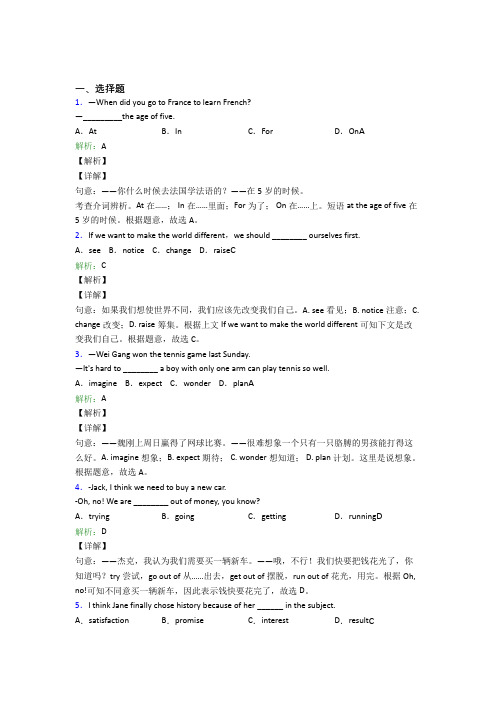
一、选择题1.—When did you go to France to learn French?—_________the age of five.A.At B.In C.For D.On A解析:A【解析】【详解】句意:——你什么时候去法国学法语的?——在5岁的时候。
考查介词辨析。
At在……; In在……里面;For为了; On在……上。
短语at the age of five在5岁的时候。
根据题意,故选A。
2.If we want to make the world different,we should ________ ourselves first.A.see B.notice C.change D.raise C解析:C【解析】【详解】句意:如果我们想使世界不同,我们应该先改变我们自己。
A. see看见;B. notice注意;C. change改变;D. raise筹集。
根据上文If we want to make the world different可知下文是改变我们自己。
根据题意,故选C。
3.—Wei Gang won the tennis game last Sunday.—It's hard to ________ a boy with only one arm can play tennis so well.A.imagine B.expect C.wonder D.plan A解析:A【解析】【详解】句意:——魏刚上周日赢得了网球比赛。
——很难想象一个只有一只胳膊的男孩能打得这么好。
A. imagine想象;B. expect期待; C. wonder想知道; D. plan计划。
这里是说想象。
根据题意,故选A。
4.-Jack, I think we need to buy a new car.-Oh, no! We are ________ out of money, you know?A.trying B.going C.getting D.running D解析:D【详解】句意:——杰克,我认为我们需要买一辆新车。
takeFrenchleave(法国式的离开)
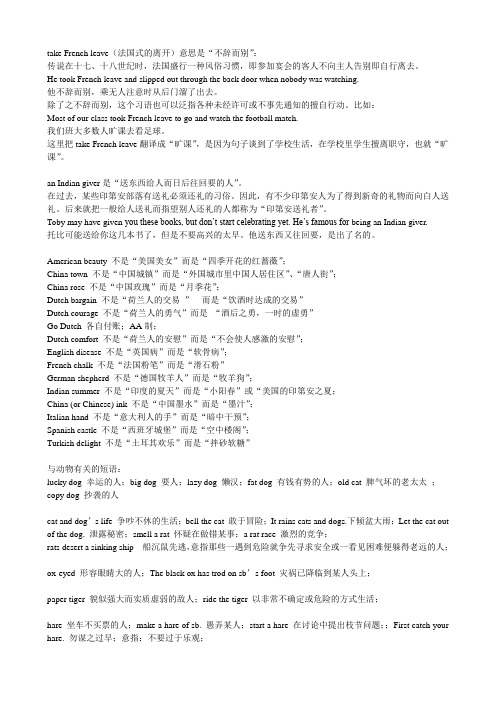
take French leave(法国式的离开)意思是“不辞而别”:传说在十七、十八世纪时,法国盛行一种风俗习惯,即参加宴会的客人不向主人告别即自行离去。
He took French leave and slipped out through the back door when nobody was watching.他不辞而别,乘无人注意时从后门溜了出去。
除了之不辞而别,这个习语也可以泛指各种未经许可或不事先通知的擅自行动。
比如:Most of our class took French leave to go and watch the football match.我们班大多数人旷课去看足球。
这里把take French leave翻译成“旷课”,是因为句子谈到了学校生活,在学校里学生擅离职守,也就“旷课”。
an Indian giver是“送东西给人而日后往回要的人”。
在过去,某些印第安部落有送礼必须还礼的习俗。
因此,有不少印第安人为了得到新奇的礼物而向白人送礼。
后来就把一般给人送礼而指望别人还礼的人都称为“印第安送礼者”。
Toby may have given you these books, but don’t start celebrating yet. He’s famous for being an Indian giver.托比可能送给你这几本书了,但是不要高兴的太早。
他送东西又往回要,是出了名的。
American beauty 不是“美国美女”而是“四季开花的红蔷薇”;China town 不是“中国城镇”而是“外国城市里中国人居住区”、“唐人街”;China rose 不是“中国玫瑰”而是“月季花”;Dutch bargain 不是“荷兰人的交易”而是“饮酒时达成的交易”Dutch courage 不是“荷兰人的勇气”而是“酒后之勇,一时的虚勇”Go Dutch 各自付账;AA制;Dutch comfort 不是“荷兰人的安慰”而是“不会使人感激的安慰”;English disease 不是“英国病”而是“软骨病”;French chalk 不是“法国粉笔”而是“滑石粉”German shepherd 不是“德国牧羊人”而是“牧羊狗”;Indian summer 不是“印度的夏天”而是“小阳春”或“美国的印第安之夏;China (or Chinese) ink 不是“中国墨水”而是“墨汁”;Italian hand 不是“意大利人的手”而是“暗中干预”;Spanish castle 不是“西班牙城堡”而是“空中楼阁”;Turkish delight 不是“土耳其欢乐”而是“拌砂软糖”与动物有关的短语:lucky dog 幸运的人;big dog 要人;lazy dog 懒汉;fat dog 有钱有势的人;old cat 脾气坏的老太太;copy dog 抄袭的人cat and dog’s life 争吵不休的生活;bell the cat 敢于冒险;It rains cats and dogs.下倾盆大雨;Let the cat out of the dog. 泄露秘密;smell a rat 怀疑在做错某事;a rat race 激烈的竞争;rats desert a sinking ship 船沉鼠先逃,意指那些一遇到危险就争先寻求安全或一看见困难便躲得老远的人;ox-eyed 形容眼睛大的人;The black ox has trod on sb’s foot 灾祸已降临到某人头上;paper tiger 貌似强大而实质虚弱的敌人;ride the tiger 以非常不确定或危险的方式生活;hare 坐车不买票的人;make a hare of sb. 愚弄某人;start a hare 在讨论中提出枝节问题;;First catch your hare. 勿谋之过早;意指:不要过于乐观;a snake in the grass. 潜伏的敌人或危险;Take heed of the snake in the grass. 草里防蛇;get on the high horse. 摆架子,目空一切;work like a horse. 辛苦的干活;horse doctor 兽医、庸医;dark horse. 竞争中出人意料的获胜者;There’s a black sheep in every flock.每一羊群里都会有一只黑羊,丑儿子家家有;意指:每个家里都会有个败家子He that makes himself a sheep shall be eaten by the wolf.甘心做绵羊,早晚喂豹狼(人弱受人欺)You dirty dog ! 你这个坏小子!a lucky dog. 幸运儿a dumb dog. 沉默不语的人Barking dogs seldom bite.吠犬不咬人;意指:对于高声发出恐吓,或惯于大声吼叫的人,勿须当真Every dog has his day. 凡人皆有得意日;意指:大家都有走运的一天Dog does not eat dog. 同类不相残;同室不操戈。
【推荐】19年中考英语真题分类专题17.2任务型阅读(回答问题)(第02期)(原卷版)
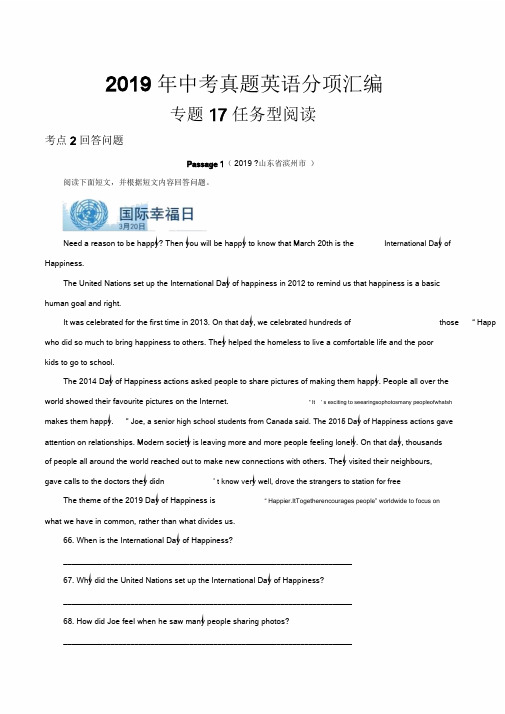
2019 年中考真题英语分项汇编专题17 任务型阅读考点2 回答问题Passage 1(2019 ?山东省滨州市)阅读下面短文,并根据短文内容回答问题。
Need a reason to be happy? Then you will be happy to know that March 20th is the International Day of Happiness.The United Nations set up the International Day of happiness in 2012 to remind us that happiness is a basichuman goal and right.It was celebrated for the first time in 2013. On that day, we celebrated hundreds of those “ Happ who did so much to bring happiness to others. They helped the homeless to live a comfortable life and the poorkids to go to school.The 2014 Day of Happiness actions asked people to share pictures of making them happy. People all over theworld showed their favourite pictures on the Internet. “ It ’ s exciting to seearingsophotosmany peopleofwhatshmakes them happy. ” Joe, a senior high school students from Canada said. The 2015 Day of Happiness actions gaveattention on relationships. Modern society is leaving more and more people feeling lonely. On that day, thousandsof people all around the world reached out to make new connections with others. They visited their neighbours,gave calls to the doctors they didn ’t know very well, drove the strangers to station for freeThe theme of the 2019 Day of Happiness is “ Happier.ItTogetherencourages people” worldwide to focus onwhat we have in common, rather than what divides us.66. When is the International Day of Happiness?_________________________________________________________________________67. Why did the United Nations set up the International Day of Happiness?_________________________________________________________________________68. How did Joe feel when he saw many people sharing photos?_________________________________________________________________________69. According to the passage, more and more people are feeling happy in modern society, aren ’_________________________________________________________________________70. What is the theme of 2019 Day of Happiness?_________________________________________________________________________Passage 2(2019 ?北京市)Huge Waves Destroying Arctic Ice Faster than ExpectedIce covers much of the Arctic Ocean(北冰洋). Some pieces of ice are huge, like moving islands. As temperatures have increased, however, some of the ice has begun to disappear. Scientists have discovered hugewaves(海浪)in the arctic waters.The waves were discovered by accident in May, 2010. Scientist Aleksey Marchenko and his students set outon a trip. They wanted to study the icy waters.On May 2, the ship traveled east and stopped next to a large chunk of ice around 50 miles from the smallisland of Hopen. Marchenko prepared to lead his students out onto the Ice."We were ready to go but when I went out, I discovered many cracks (裂缝)around," he remembers.He decided to move the ship deeper into the ice to keep safe. The farther in they went, he thought, the harderthe ice would become. As they pushed forward, however, the ship experienced small waves, and then biggerones. Soon, the waves broke up the ice around the ship into thousands of smaller pieces .Within an hour, Marchenko and his team saw a wave that was about 13 feet high. The ship's navigation (航行)system finally recorded the largest waves. They were more than 20 feet in height. The waves were so strong thatthey forced huge pieces of ice to jump up and down, breaking the ice into smaller pieces within just one hour.Scientists had never imagined that the process could happen so fast. The waves in these areas used to be small.The speed and force of the huge waves there makes it impossible to know in advance when they are coming.That could be dangerous for navigators and local communities who are unprepared for huge waves or depend onsea ice to protect them. Wildlife like polar bears and walruses that depend on sea ice to live is also in danger. Some scientists think people will soon see even bigger waves in these icy waters. As waves break up ice, theseas will become more open, and the waves will get even stronger. There are stormy times ahead.34. When did Marchenko and his students discover huge waves in the arctic waters?35. Why did Marchenko and his students set out on the trip?36. What did Marchenko decide to do to keep safe?37. How high were the largest waves recorded by the navigation system?38. What is Paragraph 7 mainly about?Passage 3(2019 ?安徽省)阅读下面短文,并用英语回答问题(请注意每小题后面的词数要求)。
人教版八年级下册Unit6 课时练(Section A)(有答案)
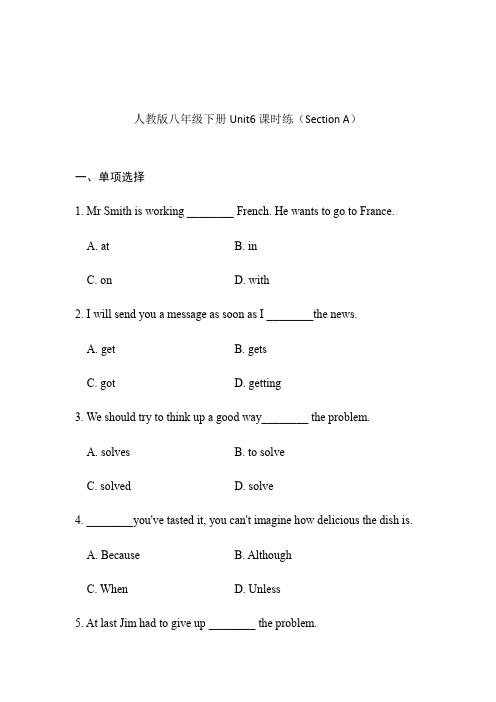
人教版八年级下册Unit6课时练(Section A)一、单项选择1. Mr Smith is working ________ French. He wants to go to France.A. atB. inC. onD. with2. I will send you a message as soon as I ________the news.A. getB. getsC. gotD. getting3. We should try to think up a good way________ the problem.A. solvesB. to solveC. solvedD. solve4. ________you've tasted it, you can't imagine how delicious the dish is.A. BecauseB. AlthoughC. WhenD. Unless5. At last Jim had to give up ________ the problem.A. solveB. to solveC. solvingD. solved6. The letter was personal, so he ________ it in the drawer.A. usedB. sharedC. hidD. swung7. —I wonder how she________ stone ________ gold.—Come on. It's just a magic show.A. turned;intoB. compared;withC. turned;downD. compared;to8. Tony becomes interested in________ . He swims almost every day in summer.A. swimB. swimingC. to swimD. swimming9. ________ the story better, Mike asked his friend for help.A. UnderstandB. To understandC. UnderstandsD. Understood10. In the song I Bet My Life, the US rock band Imagine Dragons tellspeople never to ________ catching their dreams.A. give upB. give outC. give inD. give off11. Last year I visited Wuhan. It was so beautiful, and I fell in love ________ it.A. fromB. ofC. withD. on12. They couldn't stop ________ after they heard the story.A. laughB. laughingC. to laughD. laughed13. Ms Yang felt so tired that she fell asleep ________ she lay down on the bed.A. ever sinceB. unlessC. as soon asD. even though14. —I argued with my mother this morning,because she didn't buy me a bike.—Don't be ________. You should say sorry to her now.A. stupidB. nervousC. luckilyD. excited15. Jim ________ the exam unless he ________ hard.A. won't pass;worksB. doesn't pass;worksC. won't pass;will workD. doesn't pass;will work二、根据汉语提示完成句子,每空一词16. 他父亲的新书是在去年出版的。
有关国家的英文表达
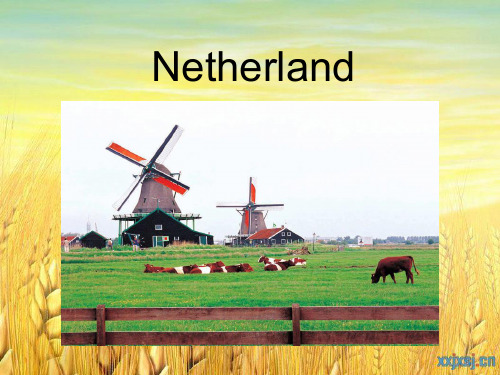
• Dutch defence: to make a show of strength and bluster; to bluff (虚张声势 ) • I'm afraid the enemy maintained a kind of Dutch defence. 恐怕敌人的防御是虚张声势的。
• Dutch act: suicide自杀 •Three days later, the prisoner was found dead in his cell, and people believe he did the Dutch act. 三天以后,有人发现犯人死在他的单人牢房里, 人们相信他是自杀的。
Spain
• Spanish athlete : a person who boasts and talks nonsense (吹牛的人,胡乱说话的人) • Castle in Spain/Spanish castle: castle in the air or daydream
• Chinese copy : an exact copy of an original(与原物一模一样的 复制品) copycat 山寨 • Chinese puzzle:something difficult to understand or to do The tangram 七巧板 the Nine 九连环 • Chinese Wall: the Great Wall • China plate: good friend •
Greece
• a Greek gift: something given with intent to harm别有用 心的礼物,害人的礼物 He is always buying you expensive clothes, I'm afraid they are Greek gifts for you. 他总 给你买很贵的衣服,我怀疑他没安好心。 • It‘s Greek to me. I don’t know.
巴黎导游词英文(通用18篇)

巴黎导游词英文(通用18篇)巴黎英文篇1Paris, France (Paris) - the heart of the fashion capital of the French, the hometown of the world of fashion, romantic, one of the most prosperous city in the world. In urban communities in Paris, everywhere can see the museums, theatres, gardens, fountains and sculptures, cultural environment is very good. Paris is the city of art, and previously the capital for flowers. Whether it is in the room, balcony, yard, or in the shop window... Before and on the side of the road, there are flowers blooming everywhere, everywhere, all the charming fragrance. As for the colorful flower blossoms and parks, but also often let people stop viewing, linger. to watch the tour Eiffel Tower in Paris, star/square arc DE triomphe, the Louvre museum and the Louvre museum, Notre Dame DE Paris, champs elysees, the Seine, Fontainebleau palace, Versailles palace, etc.Arc DE triomphe remain famous arc DE triomphe by Roman period, it is located in Paris at the end of the champs elysees, Charles DE gaulle star the center of the square, is the largest of more than 100 European arc DE triomphe. This bridge was built in honor of napoleon's expedition, there are four positive relief - the "marseillaise", "victory", "resistance" and "peace". This is one of the most attractive on pillars of for rural street on the right side of the "1792 volunteers expedition", known as the "marseillaise" glyph, occupy the important position is the world's art history of the immortal masterpiece. Notre Dame DE Paris, arc DE triomphe in Paris because of the adaptation of the classic novel with the same name and opera, not how many people are against the church and the hunchback Quasimodo feel strange.This classic gothic church is located in downtown Paris, France, is the west dike landmarks on the island, also is the Catholic archdiocese of Paris cathedral. To Notre Dame DE Paris, the best from the church of the north gate to enter, entered the three roses can bump into gorgeous picture window.The shops on both sides of the Notre Dame DE Paris is also very famous, you can buy a lot of nice souvenir, the most popular is a kind of version: into a 2 euro COINS, it will spit out a new COINS, its design is the virgin el nino. Notre Dame DE Paris, the Louvre, it may be the world's most famous museum and art gallery, and France's oldest palace. Related to the Louvre movies such as "the phantom of the Louvre. Here includes sculpture gallery, painting and the ancient Egyptian art museum, one of the most famous, including the Minos Venus, goddess of victory, and "Mona Lisa" and so on. Feeding out many world famous art here. Of course is more regular visitors here as viewing the palace of fine arts of the world.巴黎导游词英文篇2The French capital Paris is one of the top ten cities in the world. It is located in the middle of the basin in northern France in Paris, the city across on both sides of the Seine. There are small points of Paris, a greater Paris. Small Paris in Paris city within the big ring road, covers an area of 105 square kilometers, population of more than 200; A greater includes seven provinces around the city, an area of 120xx square kilometers and a population of about 10 million, almost one 5 of the population. Is the largest city in France, it is also one of the world's most populous metropolis.Paris celebrates its 1400 years of history, the city has 20xx years of history. People roaming the city, is one of the mostprofound impression: it retains much of the world famous historical monuments, and there are many magnificent modern buildings, there are "flowers" laudatory name.Paris is France's political, economic and cultural center. In terms of cultural facilities, Paris has built the world's largest with electronic computer control of modern art and cultural center - pompidou national center for art and culture, also has many world famous monuments and artistic construction. Like the Eiffel Tower, the Notre Dame DE Paris, place DE la Concorde, the Louvre, Versailles palace, is to let people regretted leaving. The economic life, reconstruction and rebuilding the old central business district, such as the construction of the 210 meters high, 58 layer of manas skyscrapers. Construction and expansion of the satellite city of Paris around, make people have a more spacious and comfortable living environment.Paris is not only the political, economic and cultural center of France, and is also an important part in international activities. The various types of international conference held here; Various international competitions, performances held here; Professional exhibition from all walks of life held here. Permanent international organizations are also many, such as the headquarters of the United Nations educational, scientific and cultural organization is based in here.Today in Paris, France is not alone, but also Western Europe's political, economic and cultural center, is the world's attention. 巴黎导游词英文篇3"Je t 'aime, Paris!" Paris, prehistoric burial at sea level under the land, in the city of more than 20xx years later, the name will not let anyone strange. Huadu, the world famous historical and cultural city known as the city of light, romantic, fashion, food ofall... Maybe you just want to go to the avenue montaigne likes shopping, maybe just want to take a walk to the river Seine, maybe you just want to go to Michelin restaurant taste French dinner, on the left bank may just want to drink coffee, maybe you just want to go to the Louvre to see the Mona Lisa smile... Maybe the earth only Paris can satisfy everyone's expectations.Paris from the earliest channel island, on the left bank to the river Seine is divided into the right bank, after several expansion, Paris now has "small Paris" and "greater"; Refers to the small Paris is divided into 20 downtown district of Paris, the French population "Paris" and indicated in the address of "Paris" generally refers to the Paris city, zip code for the 750 , most of the attractions such as the Eiffel Tower, the Louvre, Notre Dame DE Paris located in Paris, attractions relatively concentrated, so walking is a good choice. The greater is the small plus around Paris suburb of seven provinces of Ile DE - France (French island district), there are many worthy to place, such as the palace of Versailles, Fontainebleau, Disneyland, etc.Once backpackers in Opera (Opera house), with the gradual rise of land price in Paris, has various levels of tourists all over Paris any corner of the left bank and Montmartre became to be bestowed favor on newly. Developed and convenient public transport is the first choice for travel, ride a bike or walk is also a good idea. In an urban area, drive is definitely not a good choice, the Paris government environmental protection very discouraged road trip to Paris.巴黎导游词英文篇4大家好!我是你们今天的导游——林导,大家可千万不要叫我领导哦!我只是姓林的导游,哈哈!Everybody is good! I am your tour guide, guide Lin today,you don't call me leadership oh! I just named Lin tour guide, ha ha!我们今天要前往名胜古迹——故宫。
关于go的短语
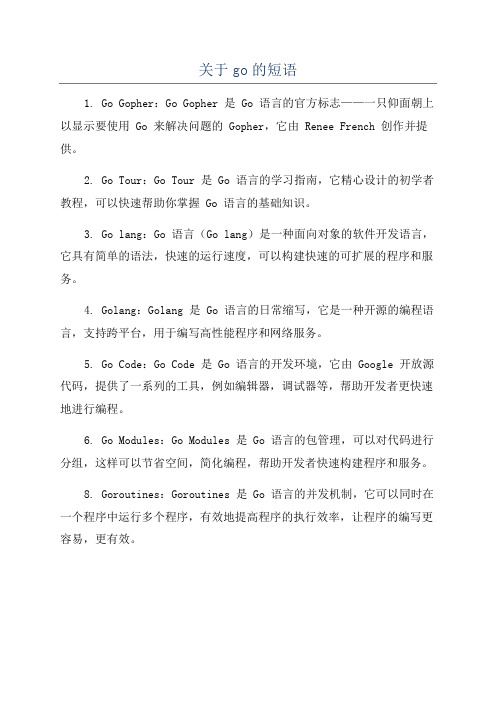
关于go的短语
1. Go Gopher:Go Gopher 是 Go 语言的官方标志——一只仰面朝上以显示要使用 Go 来解决问题的 Gopher,它由 Renee French 创作并提供。
2. Go Tour:Go Tour 是 Go 语言的学习指南,它精心设计的初学者教程,可以快速帮助你掌握 Go 语言的基础知识。
3. Go lang:Go 语言(Go lang)是一种面向对象的软件开发语言,它具有简单的语法,快速的运行速度,可以构建快速的可扩展的程序和服务。
4. Golang:Golang 是 Go 语言的日常缩写,它是一种开源的编程语言,支持跨平台,用于编写高性能程序和网络服务。
5. Go Code:Go Code 是 Go 语言的开发环境,它由 Google 开放源代码,提供了一系列的工具,例如编辑器,调试器等,帮助开发者更快速地进行编程。
6. Go Modules:Go Modules 是 Go 语言的包管理,可以对代码进行分组,这样可以节省空间,简化编程,帮助开发者快速构建程序和服务。
8. Goroutines:Goroutines 是 Go 语言的并发机制,它可以同时在一个程序中运行多个程序,有效地提高程序的执行效率,让程序的编写更容易,更有效。
去法国巴黎旅游一次,英语作文40个单词

去法国巴黎旅游一次,英语作文40个单词全文共6篇示例,供读者参考篇1A Trip to Paris, FranceBonjour! My name is Emma and I just went on the most amazing trip to Paris, France with my family. I had been dreaming of visiting the City of Lights ever since I saw pictures of the Eiffel Tower in my textbook. When my parents surprised me with plane tickets for my 10th birthday, I was beyond excited!The flight from New York to Paris took around 7 hours. I watched movies, played games, and even took a nap on the plane. When we finally landed at Charles de Gaulle Airport, I could hardly contain my enthusiasm. We took a taxi into the city center and I gazed out the window, in awe of the beautiful Parisian architecture with its ornate doors, window boxes overflowing with flowers, and charming cafes on every corner.Our hotel was in a historic building just a few blocks away from the Champs-Élysées. After dropping off our bags, we headed straight to the most famous landmark in Paris - the Eiffel Tower! It was even more magnificent in person than in pictures.The intricate ironwork seemed to shimmer in the sunlight as we approached. We took a million photos in front of the tower and then went up to the observation deck on the second level. The view overlooking the city was breathtaking!The next day, we visited Notre-Dame Cathedral which took my breath away with its stunning gothic architecture and colorful stained glass windows. I felt so tiny standing under the soaring arched ceilings. We also went on a cruise along the River Seine which was a great way to see the city's main sights like the Louv re Museum, the Musée d'Orsay, and the Arc de Triomphe.One of the highlights was exploring the endless halls of the Louvre and gazing at famous masterpieces like the Mona Lisa and the Venus de Milo. I couldn't believe I was standing just feet away from these iconic works of art that I had studied in school. The Louvre used to be a palace for French royalty so the building itself was also a work of art.On our last day, we did some shopping along the Champs-Élysées and brought home tons of souvenirs like berets, Eiffel Tower keychains, artwork, and of course, lots of chocolate! I also got my face painted like a Parisian street artist in the Latin Quarter.Saying au revoir to Paris was difficult, but I have so many wonderful memories from this trip that I will cherish forever. Visiting the Eiffel Tower, Notre-Dame, the Louvre, and experiencing the city's incredible history, culture, and cuisine was a dream come true. Although I may be a young girl fromsmall-town America, I felt like a true Parisian during those magical days in the City of Light. I am already counting down the days until I can return to romantic Paris!篇2A Trip to Paris, FranceBonjour! My name is Emma and I justgot back from the most amazing trip to Paris, France! I had been begging my parents to take me there for years because I loved learning about the Eiffel Tower and the Louvre Museum in school. When they finally said yes, I could hardly believe it!We took a really long flight from America to get to Paris.I had never been on a plane before, so I was a little nervous, but also really excited. The flight attendants were so nice and gave me a coloring book, crayons, and a big bag of pretzels to keep me busy. I looked out thewindow as much as I could to see the clouds and tiny houses and cars below. It looked like a miniature world down there!When we finally landed in Paris, the first thing I noticed was how different everything looked and sounded. The buildings were old and made of stone instead of glass like in America.And everyone was speaking in rapid French, which I didn't understand at all at first. My parents had to help me a lot with the language barrier in the beginning.Our hotel was right in the heart of the city, just a short walk from the famous Arc de Triomphe.From our hotel window, I could see the topof the Eiffel Tower peeking out in the distance! I was so excited to go visit it up close.The next morning, we took the metro (that's like an underground train system) over to the Eiffel Tower.It was even taller and more massive thanI had imagined - we had to tilt our heads all the way back just to see the top! We bought tickets to take an elevator ride up to one of the observation decks near the top. The view from up there was breathtaking. I could see the entire city of Paris laid outbelow me like a miniature model. We took about a million pictures to try to capture it all.One of my favorite memories was our visit to theworld-famous Louvre Museum. It's this huge palace-like building that houses thousands of famous artworks and artifacts from all over the world.We spent an entire day there wandering throughthe different wings and exhibits. I was amazed at how some of the paintings and sculptures looked so lifelike and detailed up close. But my absolute favorite was seeing the Mona Lisa painting by Leonardo da Vinci behind its glass case. Her smile was just as mysterious and enchanting as I'd always heard!We also got to go on a cruise along the Seine River that winds through the heart of Paris. It was such a unique way to see the city's landmarks like Notre Dame Cathedral from the water.Our tour guide told us fun facts and storiesabout each of the sights as we slowly drifted by. I tried my best to pronounce all the French words she was teaching us!Everything was absolutely délicieux (that's the French word for delicious).On our very last day in Paris, we did one final bit of sightseeing near the Sacré-Cœur, a beautiful domed cathedral up on a hill overlooking the city. We climbed up a bunch of stairs to get to the top and look out over the skyline of Paris.I took one last deep breath of the crispParisian air, trying to etch the whole experience into my memories forever. I knew this was a trip I would never, ever forget.The plane ride home felt twice as long, simply because I didn't want to leave! I spent the entire flight looking through the hundreds of photos and videos I had taken, re-living every incredible moment. Paris was everything I had dreamed of and more. The sights, the sounds, the tastes...I fell completely in love with it all. I'm already making my parents promise to take me back someday.Maybe next time I can try to learna little more French before we go! Merci and au revoir, Paris!篇3A Trip to Paris, FranceYay, we went to Paris! My mom, dad, little brother Timmy, and I took a big plane to get to the city of Paris in the country of France. It was sooooo far away and the plane ride felt like forever. But I didn't mind too much because I got to watch movies and eat snacks.When we finally landed in Paris, everything looked different from back home. The buildings were old with pretty designs, the cars were tiny, and everyone was speaking French which I didn't understand at first. Our hotel room was small but nice, with a big window that opened up to look out at the city streets below.The very first morning, my dad took us to see the famous Eiffel Tower! It was waaaaay taller than I ever imagined up close. We took a million pictures in front of it, trying to get the perfect family photo. After that, we rode in one of those open-air double decker tour buses all around Paris. I loved sticking my head out the top level and feeling the wind blow through my hair as we drove past amazing old buildings and parks.One day, we visited a huge church called Notre Dame Cathedral. It was seriously like a castle on the inside, with super high ceilings, pretty stained glass windows, and lots of cool statues. I've never seen anything like it. My little brother Timmygot in trouble for running around yelling too loudly though - oops!Another day, we went to the most famous art museum in the world - the Louvre. There were millions of famous paintings and sculptures inside, including the Mona Lisa painting. I didn't think it looked that amazing, but it was still neat to see something so iconic up close. The building itself was like a palace and took forever to walk through.My favorite part might have been the last day when my dad got us all bikes to go on a bicycle tour around the city. We rode for miles, exploring parks, going down small side streets, and stopping for snacks and hot chocolate whenever we felt like it. I felt so free and got to see so much more of Paris that way instead of a bus.By the end, my legs were exhausted from all the walking and biking. But my heart was full from such an wonderful family trip to one of the most famous, beautiful, and fun cities in the world. I'll never forget our amazing time in Paris! When I grow up, I definitely want to go back and see it all over again.篇4My Trip to Paris!Yay, I got to go to Paris with my family this summer! Paris is the capital city of France and it's super famous for being really pretty with lots of amazing buildings and art museums. I was so excited for the trip!The flight from our hometown took forever - we were on the plane for like 10 hours! I tried to sleep but I was too hyper thinking about getting to go to Paris. When we finally landed, I pressed my face against the window to get my first glimpse of the city. It looked just like in the movies with buildings way taller than back home.Our hotel was right in the center of Paris near this famous avenue called the Champs-Élysées. There were stores and cafes lining the whole street. My little brother Tommy kept saying "Cha-mps Elly-sees" in a silly French accent and cracking himself up. The bellhop at the hotel was really nice and carried all our heavy bags up to our room.The next morning, we went to see the one landmark that everyone knows about in Paris - the Eiffel Tower! We had to take the metro, which is like an underground train that goes all over the city. The metro station had signs in French that I couldn't read at all. Good thing my parents knew where we were going! When we came up from the metro, there it was - the huge irontower looming overhead. It's way more giant than it looks in pictures! We took about a million selfies in front of it before heading up to the observation decks. The view from the top was insane - it felt like we could see the entire city of Paris stretching out in every direction.After the Eiffel Tower, we went on a river cruise along the Seine. The tour guide was pretty boring for most of it, just droning on and on about old buildings along the banks. But I perked up when she started talking about Notre Dame Cathedral. It's this awesome huge church that looks kind of like a castle from the fairy tales my mom reads to me and Tommy sometimes. The guide said it took like 200 years to build it way back in olden times! Unfortunately, we didn't get to go inside because part of it recently burned down in a fire. But just seeing the intricate stone towers and arches from the river was incredible.The next few days, we went to a bunch of different museums. In the Louvre, we saw famous works of art like the Mona Lisa painting and the Venus de Milo statue. All the other people clustered around the Mona Lisa were taking pictures but I thought it looked kinda boring to be honest. It's just a small portrait of some lady smiling! The Venus de Milo was way cooler - it's this ancient Greek statue of a woman missing her arms. Mydad tried to explain why it's considered a masterpiece of sculpture but I'll be real, I still don't totally get it.My favorite museum by far was the Musée d'Orsay. They had works by super famous artists like Monet, Renoir, Van Gogh - all the painters we learned about in art class whose landscapes and portraits looked fuzzy and sort of un-realistic. Seeing the paintings in person was mindblowing after just looking at printouts in my textbooks! The colors and textures seemed to pop off the canvases. I could have spent hours just staring at Monet's giant water lily paintings over and over.When we weren't in museums, we just wandered around different neighborhoods in Paris trying the food. Oh man, the food was out of this world! We had these crispy little croissants for breakfast every morning that were ten times better than any croissant I've had back home. For lunch and dinner, we ate at cafes and tried dishes I'd never heard of before. My favorite was croque monsieur - it's basically just a fancy grilled ham and cheese but theirs was like heaven on a plate. I also loved nutella crepes for dessert. My mom said she was proud of me for being adventurous and trying new foods instead of just wanting chicken nuggets like I usually do.I could go on and on about all the other cool things we did - see a light show at the Eiffel Tower at night, have a picnic along the Seine, watch street performers in cute little parks. But I think you get the idea - Paris was an absolute blast! My only complaint is that my feet started to really hurt from all the walking around after a few days. But that's a small price to pay for getting to experience such an amazing, historic city. I have a feeMy Trip to Paris! (Word Count: 2,006)篇5A Trip to Paris!Wow, I got to go to Paris last summer! Paris is the capital of France and it's such an amazing city. When my parents told me we were going there for our big family vacation, I was so excited I could hardly stand it. I had learned about Paris in school and it seemed like the fanciest, most beautiful place ever.The trip started with a long plane ride across the ocean. I don't really like flying because it's kind of boring and my ears hurt sometimes. But I didn't mind too much because I knew the amazing city of Paris would be waiting for us at the end! When we finally landed in Paris, I pressed my face against the windowto get my first glimpse. Even the airport looked cool and different than back home.We took a taxi from the airport to our hotel right in the heart of the city. I'll never forget my first view of the huge buildings, bustling streets, and people dressed in fancy clothes all over the place. Paris is often called the City of Light, and when we arrived at night I could see why - the whole city just seemed to glow and sparkle. Our hotel was amazing too, with big fancy beds and a great view out the window.The next day, we headed out bright and early to start exploring. Our first stop was the one I had been dreaming of - the Eiffel Tower! It's this massively tall tower made of iron lattice work that was built way back in 1889. When I first caught sight of it rising up into the sky, I couldn't believe how enormous it was. We took an elevator right up to the top observation deck and got an incredible view of the whole city below us. I felt like I was on top of the world!After the Eiffel Tower, we visited so many other cool places. We went on a cruise along the Seine River that winds through the city and got to see famous sights like the Notre Dame Cathedral and the Louvre Museum from the water. We spent a morning at the Louvre, which is this massive museum full ofsome of the most famous artwork in the world like the Mona Lisa and the Venus de Milo sculptures.One of my favorite parts though was just wandering around the different neighborhoods. Paris has these wonderful neighborhoods like Montmartre with its cobblestone streets, cute cafes, and street artists everywhere you looked. We sampled delicious French bread, pastries, and crepes from bakeries on pretty much every corner.At night, we'd often head to the parks and plazas where there always seemed to be street performers, musicians, mimes, and other entertaining things to watch. My little brother andI would get hot chocolates piled high with whipped cream to sip as we walked around and stayed out late because it didn't get dark until 10pm during the summer.I have so many amazing memories from our trip to Paris - from climbing up the spiral stairs inside the Eiffel Tower, to exploring the underground catacombs made up of millions of skeletons, to taking a day trip out to the Palace of Versailles with its incredible gardens and fountains. Everywhere you looked, there was incredible food, art, architecture, history and culture.Paris really did seem like a fantasy land from storybook. Part of me wondered if I'd wake up and it would have all been adream! Now that I'm home, I miss walking along the banks of the Seine, snacking on crepes and gazing up at the beautifully lit Eiffel Tower at night. I'm already begging my parents to start planning a trip back there someday. Going to Paris was the adventure of a lifetime and I'll never forget it!篇6My Trip to Paris, FranceBonjour! That means "Hello!" in French. My name is Tommy and I just went on the most amazing trip to Paris, France with my family. Paris is the capital city of France and it's known for being really beautiful with lots of old buildings, art, and amazing food. I had been learning a little French in school, but it was so cool to actually go there and hear people speaking it everywhere!We flew on a big airplane for like a million hours to get to Paris from the United States. Well, maybe not a million hours but it did feel really long! When we got there, everything just looked so different from back home. The buildings were all old with lots of decorations and fancy details. The streets were really narrow with cars and people everywhere. And there were cafes with little tables outside on almost every corner where people would sit and drink coffee or eat yummy French food.The first big famous thing we saw was the Eiffel Tower! It's this giant tower made out of metal that was built way back in 1889 for an exhibition. From down below, it looked SOOO tall - like it stretched all the way into the clouds! We went up to the very top, which was kind of scary because the elevator was in this tiny little cage. But the view from up there was totally worth it. You could see the entire city of Paris laid out before you. It was amazing!Another really cool place we visited was the Louvre Museum. It's this massive museum that used to be an old palace for the French kings and queens a long time ago. We saw so many famous works of art like the Mona Lisa painting and the Venus de Milo statue. Some of the art was kind of weird looking to me, but a lot of it was incredible. My favorite was probably the ancient sculptures of Greek gods and heroes. I felt like I was transported back to the times of myths and legends!Speaking of legends, we also went down into the catacombs under Paris. These are old caves and tunnels under the city where they used to bury tons of skeletons and skulls! It was SUPER creepy but also kind of fascinating. All those bones just stacked up in the dark...shiver! Our guide told us there are miles andmiles of tunnels with over 6 million skeletons buried down there. No thanks, I'll take the sunny streets above ground please!Let's see, what else did we do in Paris? We took a cruise along the Seine River that runs through the middle of the city. We saw the famous cathedral called Notre Dame from the water. It's this gigantic, beautiful old church that was sadly damaged in a fire a few years ago. But they are working on repairing it. We also went to the top of the Arc de Triomphe which is this tall arched monument where you can look down at the crazy roundabout intersection with cars going every which way.Oh and the food...THE FOOD! Everything we ate in Paris was so delicious - the pastries, the crepes, the bread, the chocolate, the cheese. My favorite was probably the croque monsieur, which is a fancy grilled ham and cheese sandwich. And the hot chocolate was out of this world - so thick and rich! I don't know how the French make it taste so good. For dessert, we had these little cream puff pastries called profiteroles that were drizzled with warm chocolate sauce. Mmmmm I'm getting hungry just thinking about it!Overall, our trip to Paris was simply magnifique (that's magnificent in French!). I got to experience a whole new culture, see world-famous sights, and eat some of the best food ever. Itried my best to practice speaking French, although I still have a lot to learn. I made amazing memories that I'll never forget. Who knows, maybe I'll come back to Paris again one day and see it all with new eyes. But for now, it's au revoir Paris! Until we meet again!。
2023年六年级上学期期末英语试题
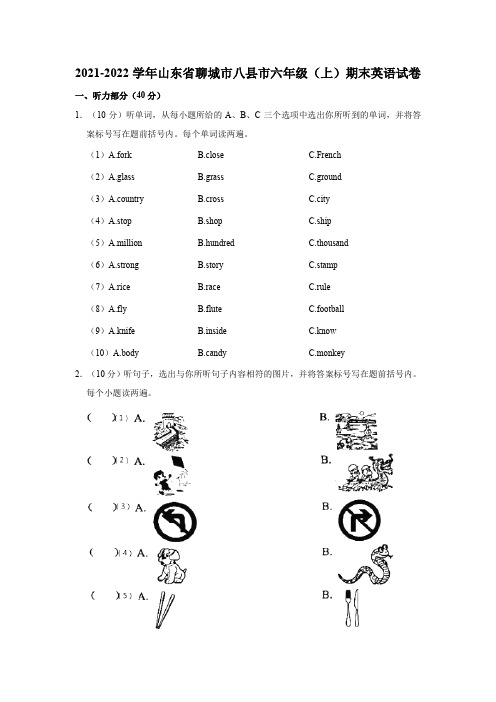
2021-2022学年山东省聊城市八县市六年级(上)期末英语试卷一、听力部分(40分)1.(10分)听单词,从每小题所给的A、B、C三个选项中选出你所听到的单词,并将答案标号写在题前括号内。
每个单词读两遍。
(1)A.fork B.close C.French(2)A.glass B.grass C.ground(3)A.country B.cross C.city(4)A.stop B.shop C.ship(5)lion B.hundred C.thousand(6)A.strong B.story C.stamp(7)A.rice B.race C.rule(8)A.fly B.flute C.football(9)A.knife B.inside C.know(10)A.body B.candy C.monkey2.(10分)听句子,选出与你所听句子内容相符的图片,并将答案标号写在题前括号内。
每个小题读两遍。
3.(5分)听录音,用数字1~5给下列图片排序,并把序号写在图片下方的括号内。
每个句子读两遍。
4.(5分)听录音,选出你所听到的句子,并将答案标号写在题前括号内。
每个句子读两遍。
(1)A.Here is my library card. B.Here is my English book.(2)A:Sheep like grass. B.Snakes love the sun.(3)A.What an interesting DVD! B.What a big building!(4)A.I want to visit China next year. B.I want to visit England next year.(5)A.Can you speak English? B.Can you speak French?5.(10分)听句子,选择恰当的答语。
从每小题所给的A、B两个选项中选出你所听到句子的恰当答语,并将答案标号写在题前括号内。
初中英语八大时态练习题(含答案)[4]
![初中英语八大时态练习题(含答案)[4]](https://img.taocdn.com/s3/m/b16dc7917fd5360cbb1adba8.png)
初中英语八大时态练习题(含答案)(word版可编辑修改)编辑整理:尊敬的读者朋友们:这里是精品文档编辑中心,本文档内容是由我和我的同事精心编辑整理后发布的,发布之前我们对文中内容进行仔细校对,但是难免会有疏漏的地方,但是任然希望(初中英语八大时态练习题(含答案)(word版可编辑修改))的内容能够给您的工作和学习带来便利。
同时也真诚的希望收到您的建议和反馈,这将是我们进步的源泉,前进的动力。
本文可编辑可修改,如果觉得对您有帮助请收藏以便随时查阅,最后祝您生活愉快业绩进步,以下为初中英语八大时态练习题(含答案)(word版可编辑修改)的全部内容。
初中英语八大时态练习题1。
I will tell him as soon as he _____ backA. come B。
comes C. will come D. came2. Mary _____ on shoes when she ____ them.A. tries…buysB. tries… buies C。
trys… buys D. trys… buies3. The girl often ______ cold when she ______.A。
cathcsdances B。
catches dancesC. catchsdanceesD. catches dancee4。
_____ he ____ himself there No, I don't think so.A. DoenjoyB. Does enjoiesC. Does enjoysD. Doesenjoy5。
_____ your teacher ____ from them very often Certainly。
A. Dohear B。
Doeshear C。
Do receive D. receive6. _____ your mother _____ some cleaning on SundaysA。
Travelling around
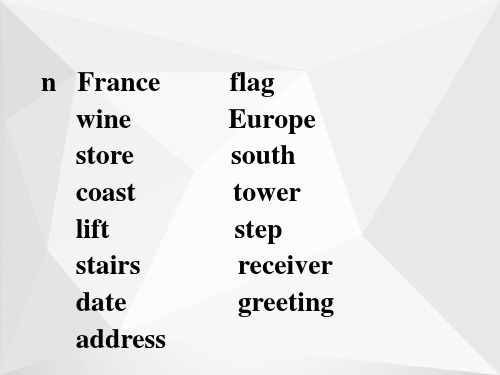
On Christmas, I __________ a post card from my friend Lily. Who’s the __________ of this letter?
received
receiver
France French flag wine tick possible Europe
south
north
west
east
lie
v. 坐落于
lie - lay - lain
广东省坐落于中国的南部。
Guangdong Province lies in the south of China.
coast n. 海岸
on the coast 在海岸上
prefer v. 更喜欢
n France flag wine Europe store south coast tower lift step stairs receiver date greeting address
法国 法国的 旗帜 葡萄酒 标记号 可能的 欧洲
store excellent south lie coast perfect ski
百货商店 优秀的 南方 位于 海岸 完美的 滑雪
tower finish lift step stairs receiver date
塔 完成 电梯 台阶 楼梯 接收者 日期
greeting address
问候 地址
greeting address
问候 地址
be famous for department store prefer to go on holiday go sightseeing
同义句转换

同义句转换Letter A1.A litter / a bit / a bit of 一点儿,少许①她可以和你一起去,因为她懂一点儿法语。
She can go with you because she knows _____French.②虽然我比他年龄小,但我比他高一点。
I’m younger than him but I’m _____ taller than him .2.A lot of / lots of / many / much 许多的,大量的①许多艺术家将在晚会上露面。
_____ artists will show their faces at the party.②那个女人有许多钱,但她并不幸福。
The woman has_____ money ,but she isn’t happy.3.Actually / in fact 事实上,实际上我原以为工作会很难,事实上却很容易I thought the work would be difficult. _____, it is very easy.4.again and again / over and over again 一次又一次地我再一次告诉你别那么做I’ve told you not to do that_____.5 .all / whole 所有的,整个的全城的人都在忙着打扫街道。
a. _____ the city are busy cleaning the streets.b. The_____ city are busy cleaning the streets.6 .also / too / as well 也不要嘲笑他,他也是我们其中的一员a. Don’t laugh at him, he’s _____ a member of us.b. Don’t laugh at him, he’s a member of us _______.7. another / one more / another+数字+n(pl.) / 数字+ more + n (pl.) 再一个,另一个①我还没吃饱呢,我想要一块蛋糕。
世界各国趣味英语文化
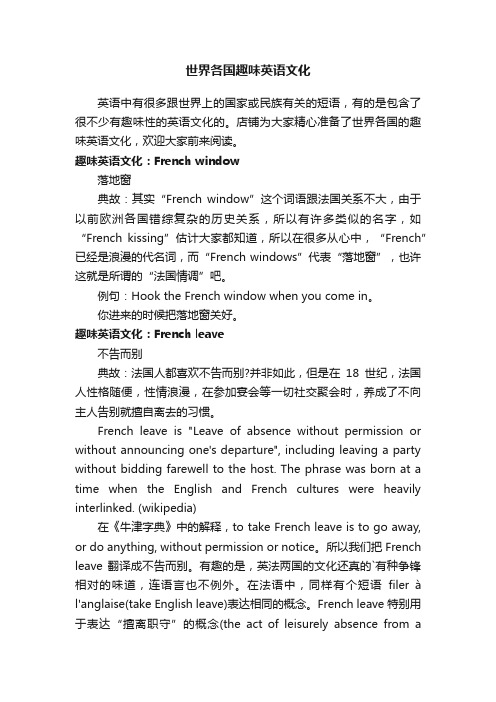
世界各国趣味英语文化英语中有很多跟世界上的国家或民族有关的短语,有的是包含了很不少有趣味性的英语文化的。
店铺为大家精心准备了世界各国的趣味英语文化,欢迎大家前来阅读。
趣味英语文化:French window落地窗典故:其实“French window”这个词语跟法国关系不大,由于以前欧洲各国错综复杂的历史关系,所以有许多类似的名字,如“French kissing”估计大家都知道,所以在很多从心中,“French”已经是浪漫的代名词,而“French windows”代表“落地窗”,也许这就是所谓的“法国情调”吧。
例句:Hook the French window when you come in。
你进来的时候把落地窗关好。
趣味英语文化:French leave不告而别典故:法国人都喜欢不告而别?并非如此,但是在18世纪,法国人性格随便,性情浪漫,在参加宴会等一切社交聚会时,养成了不向主人告别就擅自离去的习惯。
French leave is "Leave of absence without permission or without announcing one's departure", including leaving a party without bidding farewell to the host. The phrase was born at a time when the English and French cultures were heavily interlinked. (wikipedia)在《牛津字典》中的解释,to take French leave is to go away, or do anything, without permission or notice。
所以我们把French leave 翻译成不告而别。
有趣的是,英法两国的文化还真的`有种争锋相对的味道,连语言也不例外。
- 1、下载文档前请自行甄别文档内容的完整性,平台不提供额外的编辑、内容补充、找答案等附加服务。
- 2、"仅部分预览"的文档,不可在线预览部分如存在完整性等问题,可反馈申请退款(可完整预览的文档不适用该条件!)。
- 3、如文档侵犯您的权益,请联系客服反馈,我们会尽快为您处理(人工客服工作时间:9:00-18:30)。
}
"[english]Go_DisagreeDeadPieces_Title" "Go - Dead Pieces Disagreement"
"Go_DisagreeDeadPieces_Text" "Votre adversaire et vous êtes en désaccord sur les pierres mortes.
"
"[english]Go_ChooseBlack" "You have chosen Black. You make the first move.
"
"Go_OppChooseWhite" "Votre adversaire a choisi les blancs. Vous ouvrez la partie.
"Go_PickWhite" "Blancs (jouent en deuxième)"
"[english]Go_PickWhite" "White (Play Second)"
"Go_ChooseWhite" "Vous avez choisi les Blancs. Votre adversaire ouvre la partie.
"
"Go_TurnPass" "Tour %s1 : %s2 a réussi.
"
"[english]Go_TurnPass" "Turn %s1: %s2 passed.
"
"Go_Prisoners_Label" "Prisonniers : %s1"
"[english]Go_Prisoners_Label" "Prisoners: %s1"
"Go_GameOver_Title" "Go - Partie terminée"
"[english]Go_GameOver_Title" "Go - Game Over"
"Go_Btn_Submit" "Sou&mettre"
"[english]Go_Btn_Submit" "Sub&mit"
"
"[english]Go_OppChooseBlack" "Your opponent has chosen Black. It is their move.
"
"Go_InvalidMove_Ko" "Impossible de placer une pierre ici. Règle Ko.
"
"[english]Go_ReceiveDeadSuggestions" "Received opponents dead pieces suggestion.
"
"Go_AgreeDeadPieces" "Les deux côtés sont d'accord sur les pierres mortes. Le jeu a enlevé les pierres mortes. Détermination du territoire en cours.
"Go_DoublePass" "Les deux joueurs ont réussi. La décision se fait aux pierres mortes. Cliquez sur les pierres mortes.
"
"[english]Go_DoublePass" "Both players have passed. Must decide on dead pieces. Click on dead pieces.
"
"Go_PickDeadPieces" "Prenez les pierres mortes.
"
"[english]Go_PickDeadPieces" "Pick Dead Pieces.
"
"Go_SendDeadSuggestions" "Envoi suggestion de pierres mortes.
"
"[english]Go_SendDeadSuggestions" "Sending dead pieces suggestion.
"
"Go_ReceiveDeadSuggestions" "L'adversaire envoie une suggestion de pierres mortes.
"Go_FinalScore" "%s1 Score : %s2"
"[english]Go_FinalScore" "%s1 Score: %s2"
"Go_MoveHistory_Title" "Go - Historique des déplacements"
"[english]Go_MoveHistory_Title" "Go - Move History"
"Go_FinalTerritory" "%s1 Territoire : %s2"
"[english]Go_FinalTerritory" "%s1 Territory: %s2"
"Go_FinalCaptured" "%s1 Capturé : %s2"
"[english]Go_FinalCaptured" "%s1 Captured: %s2"
"
"[english]Go_In NhomakorabeaalidMove_NoLife" "Cannot place piece there. No life for new piece.
"
"Go_TurnCapture" "Tour %s1 : %s2 a capturé %s3 pierres%s4.
"
"[english]Go_TurnCapture" "Turn %s1: %s2 captured %s3 piece%s4.
Veuillez continuer à jouer pour résoudre le désaccord."
"[english]Go_DisagreeDeadPieces_Text" "You and your opponent disagree on dead pieces.
Please continue to play to resolve disagreement."
"lang"
{
"Language" "french"
"Tokens"
{
"Go_Name" "Go"
"[english]Go_Name" "Go"
"Go_PickBlack" "Noirs (jouent en premier)"
"[english]Go_PickBlack" "Black (Play First)"
"
"[english]Go_ChooseWhite" "You have chosen White. Your opponent makes the first move.
"
"Go_ChooseBlack" "Vous avez choisi les noirs. Vous ouvrez la partie.
"
"[english]Go_OppChooseWhite" "Your opponent has chosen White. It is your move.
"
"Go_OppChooseBlack" "Votre adversaire a choisi les noirs. Il ouvre la partie.
"
"[english]Go_InvalidMove_Ko" "Cannot place piece there. Ko rule.
"
"Go_InvalidMove_NoLife" "Impossible de placer une pierre ici. Pas de vie pour une nouvelle pierre.
"
"[english]Go_AgreeDeadPieces" "Both sides agree on dead pieces. Game has removed dead pieces. Now trying to determine territory.
